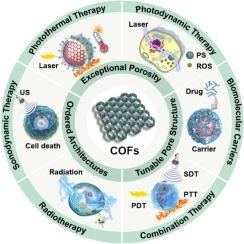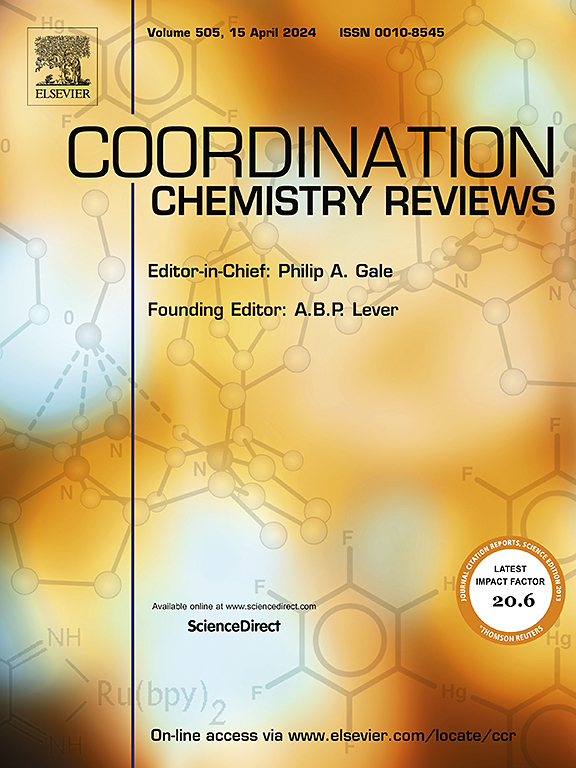共价有机框架作为精确癌症治疗的多功能纳米平台:设计原则、应用和未来展望
IF 23.5
1区 化学
Q1 CHEMISTRY, INORGANIC & NUCLEAR
引用次数: 0
摘要
癌症仍然是一个主要的全球健康挑战,因为现有的治疗方法受到全身毒性、有限的特异性和耐药性的限制。传统的纳米载体往往难以解决肿瘤异质性、多药耐药、免疫抑制微环境和多模式治疗的整合等重大障碍,从而限制了它们的整体临床疗效。在这种情况下,共价有机框架(COFs)——一类通过坚固的共价键由轻元素构成的晶体多孔材料——作为一种多功能平台出现,其特点是孔隙度可调、结晶度高、化学稳定性好。其可调节的框架结构促进多功能整合,实现精确的肿瘤靶向,控制药物释放和协同多模式治疗。本文综述了COFs的设计原理和在肿瘤治疗中的多种应用,包括治疗方式。接下来,我们系统地介绍了COFs作为生物分子载体的能力,强调了其优异的负载能力和生物相容性。此外,我们还探索了基于cof的多功能治疗平台的发展,重点关注其在联合治疗、纳米治疗和纳米酶的精确肿瘤治疗中的创新应用。最后,对本文进行了简要的总结和展望。本文章由计算机程序翻译,如有差异,请以英文原文为准。

Covalent organic frameworks as multifunctional nanoplatforms for precise cancer therapy: design principles, applications, and future perspectives
Cancer remains a major global health challenge, as existing therapies are constrained by systemic toxicity, limited specificity, and the emergence of resistance. Conventional nanocarriers often struggle to address significant barriers such as tumor heterogeneity, multidrug resistance, immunosuppressive microenvironments, and the integration of multimodal treatments, thereby limiting their overall clinical efficacy. In this context, covalent organic frameworks (COFs)—a class of crystalline porous materials constructed from light elements via robust covalent bonds—emerge as a versatile platform characterized by tunable porosity, high crystallinity, and exceptional chemical stability. Their tunable framework structure facilitates multifunctional integration, enabling precise tumor targeting, controlled drug release, and synergistic multimodal therapies. This minireview summarizes the design principles and diverse applications of COFs in tumor therapy, covering treatment modalities. Next, we systematically present the capabilities of COFs as biomolecular carriers, emphasizing their excellent loading capacity and biocompatibility. Furthermore, we explore the development of multifunctional COF-based therapeutic platforms, focusing on their innovative applications in combination therapy, nanotheranostics, and nanozymes for precise tumor treatment. Finally, a concise summary and outlook are provided.
求助全文
通过发布文献求助,成功后即可免费获取论文全文。
去求助
来源期刊

Coordination Chemistry Reviews
化学-无机化学与核化学
CiteScore
34.30
自引率
5.30%
发文量
457
审稿时长
54 days
期刊介绍:
Coordination Chemistry Reviews offers rapid publication of review articles on current and significant topics in coordination chemistry, encompassing organometallic, supramolecular, theoretical, and bioinorganic chemistry. It also covers catalysis, materials chemistry, and metal-organic frameworks from a coordination chemistry perspective. Reviews summarize recent developments or discuss specific techniques, welcoming contributions from both established and emerging researchers.
The journal releases special issues on timely subjects, including those featuring contributions from specific regions or conferences. Occasional full-length book articles are also featured. Additionally, special volumes cover annual reviews of main group chemistry, transition metal group chemistry, and organometallic chemistry. These comprehensive reviews are vital resources for those engaged in coordination chemistry, further establishing Coordination Chemistry Reviews as a hub for insightful surveys in inorganic and physical inorganic chemistry.
 求助内容:
求助内容: 应助结果提醒方式:
应助结果提醒方式:


